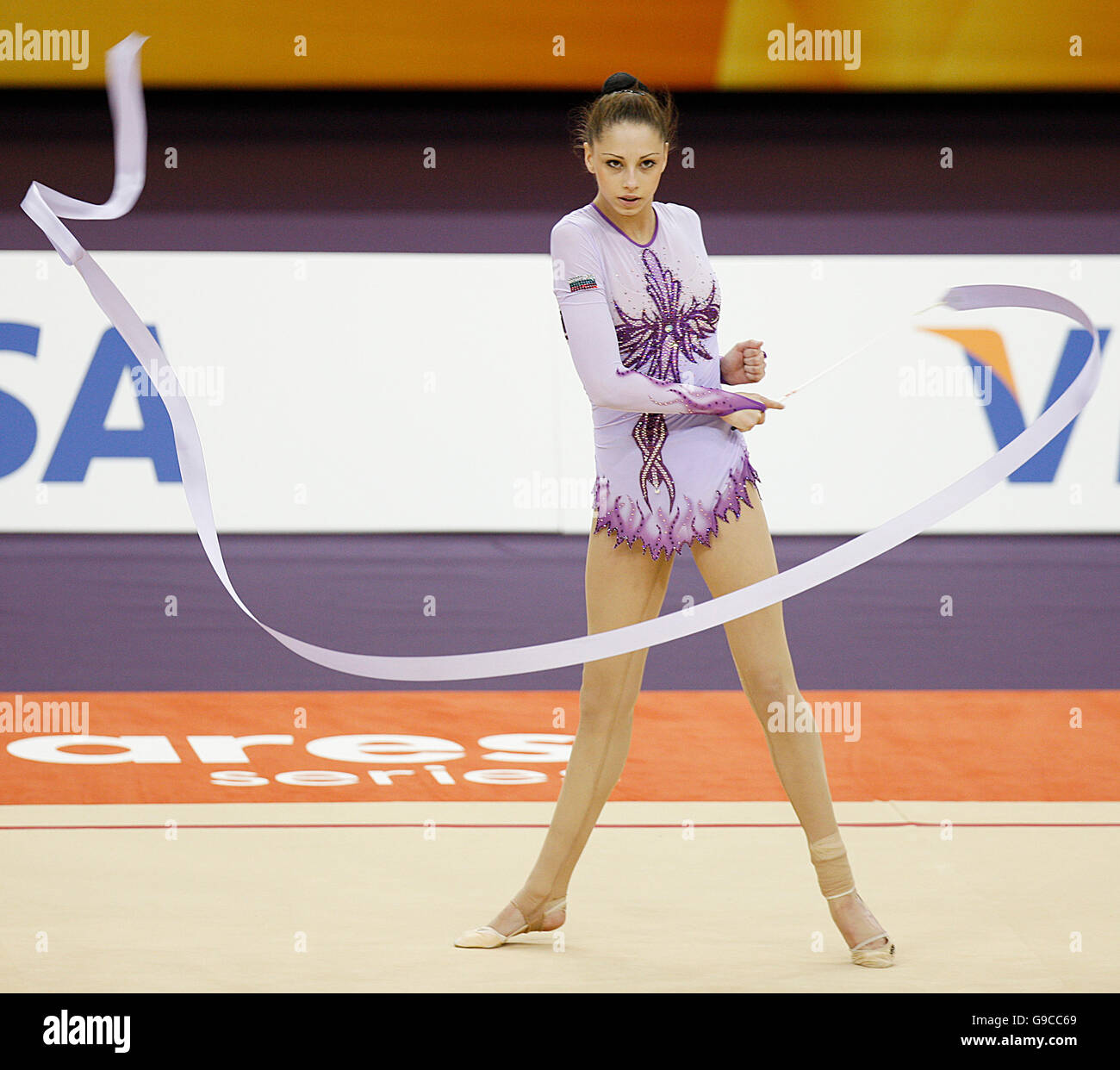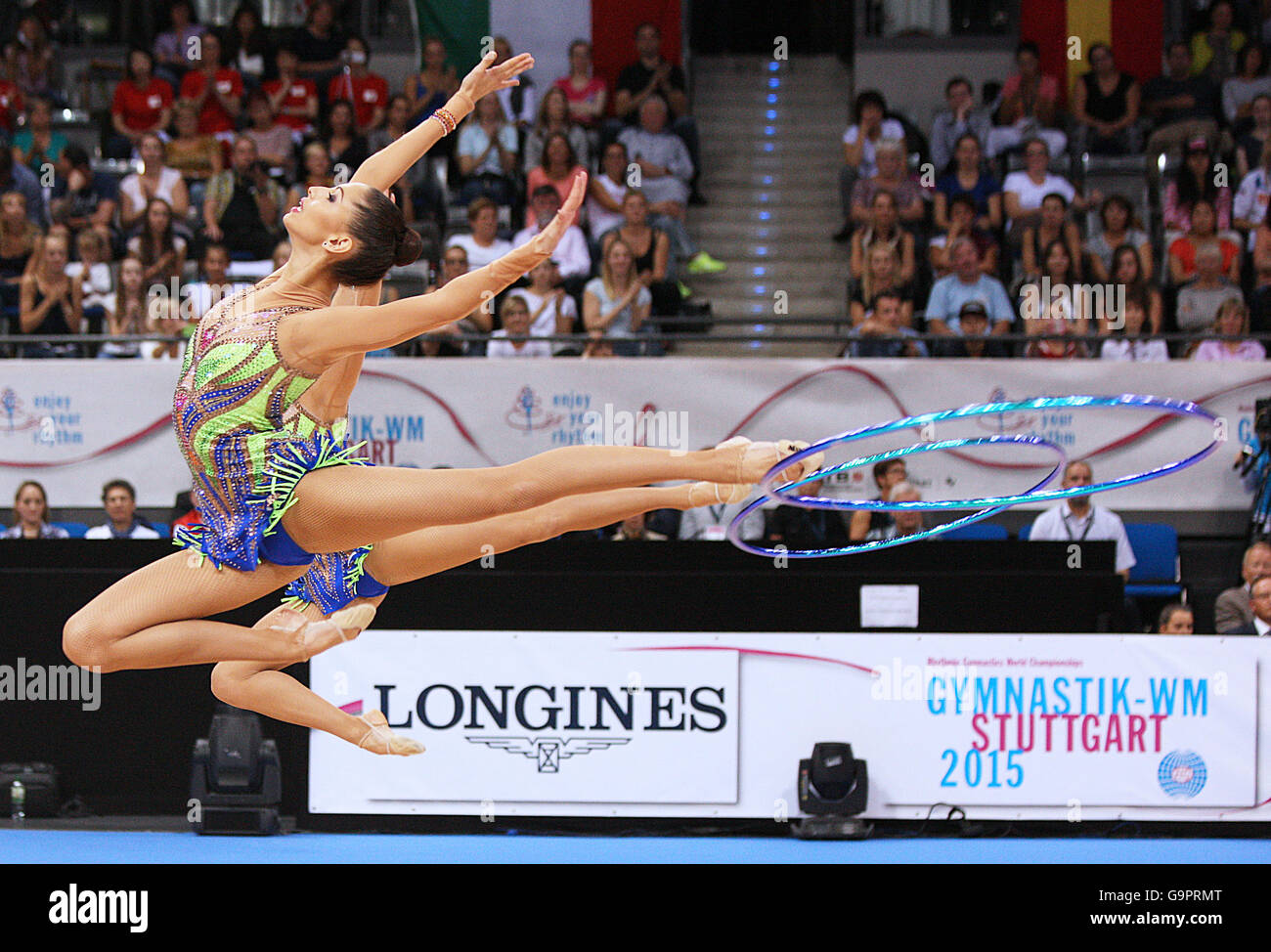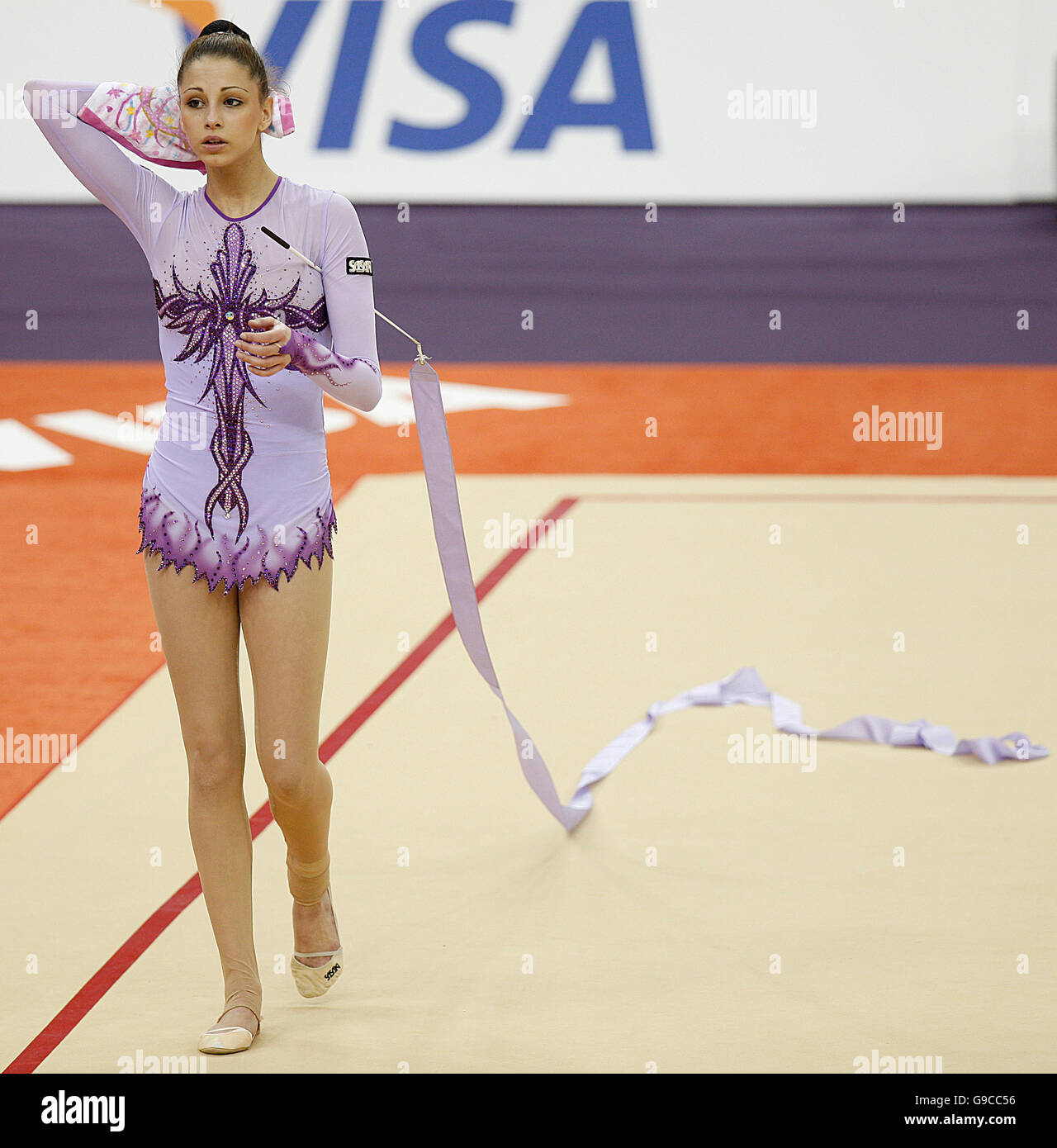When we think about the grace and skill of rhythmic gymnastics, our minds often go straight to the incredible athletes who perform on the carpet, showing off their amazing talent. But, you know, behind every dazzling routine, there is a whole network of people working hard to make sure those athletes can truly shine. It's almost like a big team effort, where each person plays a part in helping gymnasts reach their very best. This includes individuals like Tsvetelina Stefanova, whose work, in a way, helps shape the paths of those involved in this beautiful sport.
It's fascinating, really, to consider the many different roles that come together to build up a successful sports program. From the coaches who spend countless hours teaching new skills to the support staff who look after the gymnasts' well-being, every contribution matters a lot. Tsvetelina Stefanova, for instance, steps into a role that is all about developing people, helping them grow, and keeping their spirits high. This kind of work is pretty important, especially in a sport that asks so much from its participants, both physically and mentally.
So, as we look at the world of rhythmic gymnastics, it’s worth taking a moment to appreciate those who work behind the scenes. They are the ones who help create an environment where young talents can flourish and feel supported. Their efforts mean that gymnasts can focus on their training and performances, knowing there are people looking out for their overall journey. Tsvetelina Stefanova’s work as a talent development specialist, it seems, fits right into this picture, making sure that the human side of the sport gets the attention it needs.
Table of Contents
- Tsvetelina Stefanova - A Look at Her Role in Rhythmic Gymnastics
- What Does a Talent Development Specialist Do for Rhythmic Gymnastics?
- How Are Rhythmic Gymnastics Talents Nurtured?
- Is Athlete Support Crucial in Rhythmic Gymnastics?
- The Bulgarian Rhythmic Gymnastics Legacy - Where Does Tsvetelina Stefanova Fit In?
- How Do Support Systems Shape Rhythmic Gymnastics Careers?
Tsvetelina Stefanova - A Look at Her Role in Rhythmic Gymnastics
When we talk about Tsvetelina Stefanova in the context of rhythmic gymnastics, it seems her contribution centers around helping people grow and find their way. She is known as a talent development specialist, which is a role focused on the human side of any organization or field. This means she works on things like helping people improve their skills, keeping them motivated, and guiding them along their chosen career or life path. This kind of work is quite important, especially in a demanding area like elite sports, where the mental and emotional well-being of individuals can really make a difference.
The field of rhythmic gymnastics, like any high-level sport, depends on more than just physical ability. It needs a strong support system for its participants. People like Tsvetelina Stefanova, who focus on the personal and professional journeys of individuals, play a part in making sure that athletes, coaches, and staff can perform their best. Her presence in professional networks, such as LinkedIn, where many people named Tsvetelina Stefanova share information, shows her connection to broader professional communities. This suggests she is part of a wider group of individuals who contribute to various fields, including, by extension, those that interact with sports organizations.
While the specific details of her direct involvement in competitive rhythmic gymnastics are not extensively outlined, her role as a talent development specialist suggests a focus on the people within the system. This could mean helping young gymnasts transition through different stages of their training, supporting coaches in their methods, or even helping former athletes find new directions after their competitive years. It's a role that, in a way, puts the human element at the forefront, recognizing that people need care and guidance to truly succeed and stay happy in what they do.
Personal Details and Professional Contributions of Tsvetelina Stefanova
Understanding the contributions of someone like Tsvetelina Stefanova means looking at the specific information we have about her. While a detailed personal biography like a birth date or place is not available in the provided text, her professional role is quite clear. She is a specialist who helps people develop their abilities and find their way in their work. This is a very specific and valuable skill set that can be applied in many areas, including the demanding world of sports.
| Category | Information |
|---|---|
| Known Professional Role | Talent Development Specialist |
| Responsibilities | People's development, motivation, and career path within an organization |
| Professional Presence | Profiles on platforms like LinkedIn |
This table, in some respects, gives us a snapshot of what we know about Tsvetelina Stefanova. Her work centers on human potential and helping individuals reach their goals. This kind of support is often crucial in fields where high performance is expected, such as rhythmic gymnastics. It means she could be involved in creating programs that help gymnasts handle pressure, learn new skills, or simply stay positive throughout their training. Her focus on motivation and career paths also suggests she helps individuals see a future for themselves, whether in the sport or beyond it.
What Does a Talent Development Specialist Do for Rhythmic Gymnastics?
A talent development specialist, particularly one connected to a demanding field like rhythmic gymnastics, typically works on several fronts to support individuals. They might help create programs that improve skills, but also, very importantly, look after the emotional and mental strength of the people involved. This could mean designing workshops on handling competition stress or putting together plans for personal growth that go beyond just physical training. It's about building a strong foundation for individuals, both inside and outside the training hall.
For Tsvetelina Stefanova, this role likely means she helps ensure that the people within the rhythmic gymnastics community, from young hopefuls to experienced coaches, have the resources they need to thrive. She might work on making sure communication is clear, that individuals feel heard, and that pathways for improvement are well-defined. This sort of work is, you know, pretty essential for a healthy and productive environment. It helps prevent burnout and encourages a positive atmosphere where everyone can do their best work.
Furthermore, a talent development specialist might be involved in identifying potential leaders or mentors within the sport, helping them grow into those roles. They could also help bridge the gap between different generations of athletes or coaches, making sure that valuable knowledge and experience are passed down. In some respects, it's about building a stronger community, where individuals feel connected and supported throughout their time in rhythmic gymnastics. This kind of thoughtful approach to human resources is what helps a sport truly flourish over the long term.
The Impact of Tsvetelina Stefanova on Athlete Well-being
When we talk about the well-being of athletes in rhythmic gymnastics, it touches on many things, from their physical health to their mental state. A talent development specialist, like Tsvetelina Stefanova, can play a significant part in making sure these aspects are looked after. This involves setting up systems that support gymnasts through tough times, helping them manage pressure, and making sure they have a voice when things get difficult. It's about creating a safe and encouraging space for them to grow.
For instance, issues like "tough coaching or emotional abuse," which are mentioned as points of concern in the broader context of sports, highlight the need for someone to help "know when the line has been crossed." A talent development specialist could be the person or part of the team that sets up guidelines and support structures to protect athletes. They might help educate coaches on best practices or create channels for gymnasts to express concerns. This is, in a way, about protecting the human spirit of the sport.
Moreover, supporting athlete well-being also means helping them with their life outside of training. This could involve advice on education, future career options, or just general life skills. Tsvetelina Stefanova's focus on "career path" suggests she might help athletes think about what comes next, which is a big part of feeling secure and happy. It means that the support extends beyond the gym, helping athletes prepare for a full and balanced life, which is really important for their overall happiness.
How Are Rhythmic Gymnastics Talents Nurtured?
Nurturing talent in rhythmic gymnastics involves a mix of dedicated coaching, consistent training, and a supportive environment. It starts very young, with children learning the basic movements and skills. As they grow, they move into more advanced training, often participating in development camps and specialized programs. These programs are designed to help them refine their abilities and prepare for higher levels of competition. It's a gradual process that requires a lot of patience and guidance.
The "target ages of the development pipeline" suggest a structured approach to bringing up new gymnasts. This means there are specific plans for different age groups, making sure they learn the right skills at the right time. Coaches, often with many years of experience and a background as former athletes themselves, guide these young people. They pass on the traditions and high standards of the sport, which is particularly true for countries with a strong history in rhythmic gymnastics, like Bulgaria. This continuous flow of knowledge is, you know, pretty important for maintaining a high level of performance.
Beyond the technical training, nurturing talent also involves building character and mental strength. Gymnasts learn discipline, perseverance, and how to handle both success and setbacks. This is where the broader support system comes in, helping to shape well-rounded individuals. The combination of rigorous physical training and thoughtful personal development is what truly helps a young talent grow into a successful athlete, and really, a successful person.
Tsvetelina Stefanova and the Path to Growth
In the journey of a rhythmic gymnast, the path to growth is not always straight. There are ups and downs, and having someone to help guide that journey is very valuable. Tsvetelina Stefanova, in her role as a talent development specialist, could be involved in helping to smooth out some of these bumps. She might work on creating clear steps for gymnasts to follow as they move from one level to the next, making sure they understand what is expected of them and how they can improve.
This might also involve helping individuals set personal goals, not just for their gymnastics skills, but for their overall development. For instance, if a gymnast needs to improve their motivation after a difficult competition, a talent development specialist might help them find ways to rekindle their passion. It's about understanding the individual's needs and providing tailored support to help them overcome challenges. This kind of personal attention is, in some respects, what truly helps someone reach their full potential.
Moreover, her work on "career path" could mean helping young athletes think about their future, whether it's continuing in the sport at an elite level, transitioning into coaching, or exploring other opportunities. This foresight helps gymnasts feel more secure and gives them a sense of direction beyond their competitive years. It means that the growth they experience in rhythmic gymnastics can be applied to many other areas of their lives, which is a very positive outcome.
Is Athlete Support Crucial in Rhythmic Gymnastics?
Athlete support is absolutely crucial in rhythmic gymnastics, a sport that demands immense dedication, physical prowess, and mental resilience. Without a strong network of support, gymnasts would find it incredibly difficult to manage the pressures of training, competition, and personal growth. This support comes in many forms: from coaches and medical staff to psychologists and, indeed, talent development specialists. Each piece of this support system contributes to the overall well-being and success of the athlete.
Consider the intense training schedules, the need for precise movements, and the constant pursuit of perfection. Gymnasts often spend long hours in the gym, pushing their bodies and minds to their limits. During this time, having access to people who can help with physical recovery, mental focus, and emotional balance is, you know, pretty essential. It helps prevent injuries, manage stress, and keep their spirits high, allowing them to stay in the sport for longer and perform at their best.
The importance of support also becomes clear when thinking about challenging situations. For example, if a gymnast faces an injury or a setback in competition, having a support team to help them recover and regain confidence is vital. Without this help, many might simply give up. So, the presence of dedicated professionals who look after the athletes’ holistic needs is not just beneficial; it is, in some respects, a foundational element for any successful rhythmic gymnastics program.
The Broader Contribution of Tsvetelina Stefanova
Tsvetelina Stefanova's work as a talent development specialist suggests a broader contribution to the rhythmic gymnastics community, extending beyond individual athlete support. Her role implies a focus on systemic improvements, making sure that the environment itself is conducive to growth and well-being for everyone involved. This could mean helping to establish best practices for coaching, creating fair evaluation systems, or fostering a positive team culture. It's about building a stronger, more supportive framework for the sport as a whole.
For instance, if there are concerns about coaching methods or the overall atmosphere, a talent development specialist might work with leadership to address these issues. They could help implement training programs for coaches, making sure they have the tools to inspire and guide athletes in a healthy way. This kind of work helps create a culture where everyone feels valued and respected, which is, you know, very important for long-term success and happiness in any field.
Her work might also involve looking at the bigger picture of how talent is identified and nurtured from a young age. This could include advising on how to set up effective development camps or how to integrate new scientific approaches into training. By focusing on people's "development, motivation, and career path," Tsvetelina Stefanova helps ensure that the rhythmic gymnastics community remains vibrant and continues to produce amazing talent, while also looking after the individuals who make it all possible.
The Bulgarian Rhythmic Gymnastics Legacy - Where Does Tsvetelina Stefanova Fit In?
Bulgaria has a long and celebrated history in rhythmic gymnastics, known for producing many world-class athletes and maintaining very high standards. This legacy is built on years of dedicated coaching, strong traditions, and a deep passion for the sport. It's a system that has, over time, produced incredible results, with gymnasts achieving great things on the international stage. This rich background means there is a strong foundation of knowledge and experience to draw upon.
Within such a well-established system, there are many roles that contribute to its ongoing success. Beyond the gymnasts themselves and their primary coaches, there are people who work to ensure the smooth running of programs, the well-being of participants, and the continued development of new talent. These are the individuals who help maintain the high standards and ensure that the legacy continues for future generations. Tsvetelina Stefanova’s role as a talent development specialist fits into this broader picture of supporting and sustaining the sport.
Her work would be about making sure that the human elements of this legacy are nurtured. This means looking after the people who carry the traditions forward, from young gymnasts just starting out to experienced coaches who have dedicated their lives to the sport. It’s about ensuring that the methods of training are not only effective but also healthy and supportive, allowing the Bulgarian rhythmic gymnastics tradition to continue to thrive in a positive way. This contribution is, you know, pretty essential for keeping the flame alive.
Connecting with Tsvetelina Stefanova's Work
Connecting with the work of someone like Tsvetelina Stefanova means appreciating the vital, often behind-the-scenes, efforts that support the visible achievements in rhythmic gymnastics. Her focus on "people's development, motivation, and career path" shows a commitment to the human side of the sport. This kind of work is not always in the spotlight, but it forms a very important part of what makes a successful sports program tick. It's about building strong individuals who can then perform at their best.
For example, if a gymnast is struggling with motivation, Tsvetelina Stefanova's expertise would be about finding ways to help them rediscover their drive. If a coach needs support in managing a team, her role might involve providing resources or training to help them improve their leadership skills. This kind of targeted support helps ensure that everyone involved in rhythmic gymnastics, from the athletes to the staff, feels valued and has the opportunity to grow. It is, in a way, about fostering a healthy ecosystem.
Her presence in professional networks also suggests a connection to a wider community of experts who share knowledge and best practices. This means that her work is likely informed by broader ideas about human development and organizational support, which can only benefit the rhythmic gymnastics community she serves. It's about bringing a professional, human-centered approach to the very demanding world of elite sports, which is, you know, very important for sustained success.
How Do Support Systems Shape Rhythmic Gymnastics Careers?
Support systems play a very large part in shaping rhythmic gymnastics careers, from a gymnast's early days to their professional life. These systems provide the framework within which athletes can develop


